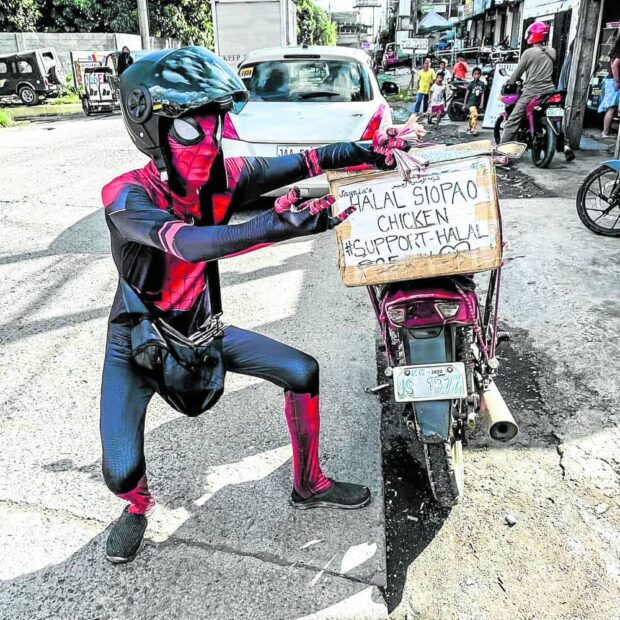Out-of-school youth grows halal ‘siopao’ business into 24/7 resto

AMAZING | As an added gimmick for his halal “siopao” business, Sayyid Sha-rif Ledesma Daham dons a Spider-Man costume to better attract customers. The United States Agency for International Development (USAID) counts him as a partner in its livelihood training program for out-of-school youths. (Photo from Spiderpao Foodhouse)
MANILA, Philippines — Sayyid Sha-rif Ledesma Daham, an out-of-school youth (OSY), started his small business at the age of 23 with only 20 pieces of siopao that he sold on the streets of Taguig City in 2018.
Now at 28, he has managed to grow his business into a small restaurant in Zamboanga City, operating 24/7 with a staff of around 20 who are also OSYs.
“From being an OSY, I have now become a youth champion,” Daham said on Wednesday during the private sector summit of “Opportunity 2.0,” a program supported by the United States Agency for International Development (USAID).
The young entrepreneur decided to move back to Zamboanga City in 2019 where he decided to innovate and align his product with the local culture.
The result: a “siopao” of the halal variety, which he can serve the Muslim community in the area. Zamboanga City, the center of trade in Western Mindanao, is currently home to nearly a million Muslim Filipinos who make up about 40 percent of its population, based on the latest data.
Article continues after this advertisementYour friendly ‘Spiderpao’
When Daham’s business started to grow, he thought of another marketing strategy to attract non-Muslim customers. Influenced by the comic book superhero Spider-Man, he would now transform into “Spiderpao,” a vendor of halal siopao dressed like the Marvel character.
Article continues after this advertisement“I captured the hearts not only of children but also adults, boys and girls. I didn’t just sell food, I also brought them joy and positivity,” he said.
Daham hired OSYs for his business because it reminded him of where he came from. “They have the heart for work which other [employers] do not always see,” he said.

Halal “siopao” (Photo from Spiderpao Foodhouse)
‘Upskilled’ workers
Being able to help others who were in the same dire situation as he was years ago left a huge impact on him. It made him realize, Daham said, that helping others in need can be as fulfilling as running the business itself.
When he opened his enterprise with just a few workers, Daham said, USAID supported him by hiring more people and training them.
The applicants were “upskilled” through Opportunity 2.0, “and when I liked their performance I will hire them and they will become permanent employees in my business,” he said.
Nancy Wallace, the interim chief of the party of Opportunity 2.0, said Usaid had found “strong partners” in Daham and other success stories like him through the five-year program that was launched in 2020 and designed to provide OSY with opportunities for improved education, livelihood, or employment.
“He embodies what the program tries to do. He’s been able to take all of his knowledge and all of his experience to grow his business and hire other OSY,” Wallace said.
The USAID’s Opportunity 2.0 program is working with 15 cities nationwide to encourage local businesses and the private sector to “open their doors” to upskill OSY as part of the workforce.
For big businesses, however, looking at the educational credentials of job applicants remains the norm, according to Erwin Banaag, director for sales and marketing of Edotco Group, a telco-infra business based in Pasig City.
Hard, soft skills
“Hard skills are an advantage but having the right attitude and helping (OSYs) develop the soft skills will turn into an advantage for them as well,” Banaag said.
Justine Raagas, executive director of the Philippine Business for Education (PBEd), said there is still hesitation and stigma in hiring and training OSY to become members of the workforce.
To help change this mindset among employers, PBEd provides “proof of concept” to partner companies to show that OSY are employable as long as they are given proper training.